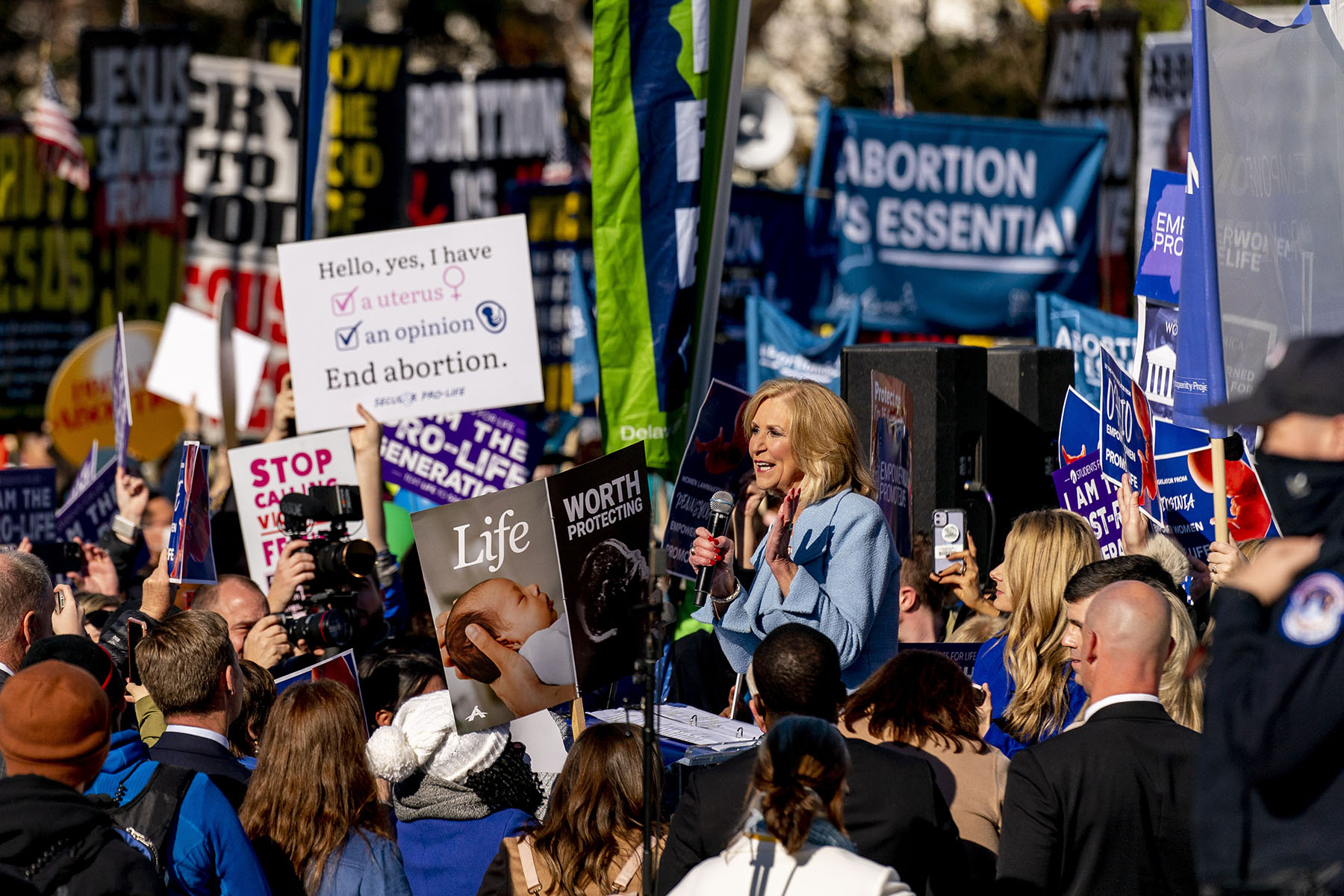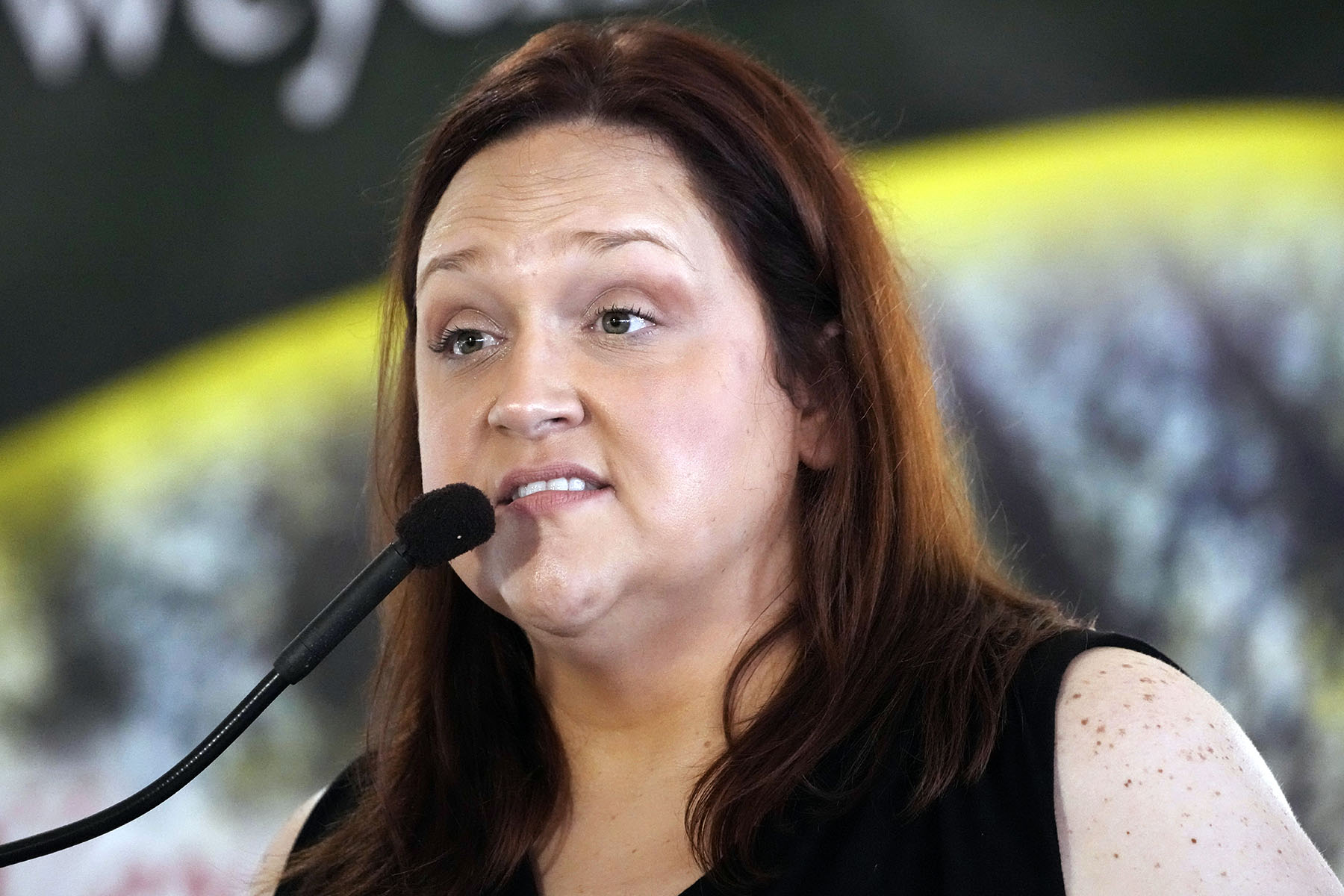Your trusted source for contextualizing politics news. Sign up for our daily newsletter.
The attorney general behind the Supreme Court’s overturn of Roe v. Wade is up for reelection in deep-red Mississippi. One Democrat wants to give her a real fight for a second term.
Greta Kemp Martin, a lawyer who works as a litigation director for Disability Rights Mississippi, said she decided last year that she couldn’t let Republican Attorney General Lynn Fitch, whose office represented Mississippi in Dobbs v. Jackson Women’s Health Organization before the Supreme Court, go unopposed.
“I jumped in the race at this time because, plain and simple, Mississippi just deserves better than what we have in our current attorney general,” Martin said. “They deserve a person who’s going to be the people’s lawyer and someone that respects their health care freedom and privacy. They deserve someone that’s gonna fight for them, because I think the state is worth fighting for.”
Fitch, Mississippi’s first woman attorney general and the first Republican to hold the office since 1878, achieved a 50-year goal of conservatives and anti-abortion advocates with the Dobbs decision, which she said would empower women. She’s touted her efforts to expand benefits and resources for pregnant women and new parents. But Martin’s campaign argues that Fitch has pursued partisan objectives at the expense of Mississippi’s poorest residents, who face hospital closures and a maternal mortality crisis that disproportionately affects Black women.
“I think that is one of the greatest problems in our state leadership right now, is that we have people in these roles who are completely disconnected with what people in our communities are going through,” Martin said. “Most people who are representing Misssippians have never experienced the type of Mississippi that my clients and most people in this state experience on a day-to-day basis.”
Brandon Jones, director of campaigns for the Southern Poverty Law Center Action Fund and the New Southern Majority PAC, which is spending money opposing first-term Republican Gov. Tate Reeves, said Fitch, formerly the state treasurer, ran as a relatively moderate alternative in the crowded 2019 Republican primary to succeed Jim Hood, a Democrat. She then easily won the general election by over 15 points. But since then, he said, she’s gone on to “sign on to the most extreme red-meat issues of the day.” Fitch’s office did not return a request for comment.
“Also, it’s pretty evident from the moment she took office that this was not a person who intended to remain attorney general,” Jones said. “She’s aspirational. This is a step along the way.”
Martin has especially criticized Fitch for not more aggressively prosecuting the state officials behind a welfare fraud scandal, reported on in-depth by Mississippi Today, in which state officials diverted $77 million in federal funds for the Temporary Assistance for Needy Families (TANF) program to unrelated projects backed by well-connected political allies and donors, including former NFL quarterback Brett Favre.
“If you are elected AG of Mississippi, you’re on Mississippi’s payroll. You are their attorney — act like it,” Martin said. “That’s all it would take. There’s no magic solution here. There’s no special wand that you can wave and fix all this. Just do the job.”
Fitch’s office approved the hire of a large law firm, Jones Walker, in a civil case to recoup the misspent funds after the state opted not to renew a contract with a Mississippi-based lawyer. She said in 2022 that her office was “very engaged” in the matter but couldn’t comment on ongoing litigation.
Fitch and other proponents of the Dobbs decision say the Supreme Court rightfully returned the question of abortion to the states. But her critics charge Fitch is imposing her views on abortion on other states by leading amicus briefs opposing a lawsuit against Florida’s 15-week abortion ban and supporting a federal lawsuit in Texas seeking to revoke the Food & Drug Administration’s approval of mifepristone, an abortion pill. Most recently, she led other attorneys general in a letter to the federal Department of Health & Human Services opposing a proposed Biden administration rule to protect the health information of patients traveling to other states for abortions.

“All we have seen over the past 12 to 24 months is her meddling in other states just because they are not pushing the same extreme agenda that she is,” Martin said. “With regards to medical records, to health decisions, all the other attempts that my opponent has made to dabble in other states’ business, I think it is absolutely atrocious.”
Mississippi is a heavily Republican state, but Martin argues that even Republican voters aren’t uniformly behind total abortion bans. Voters, she noted, rejected a fetal personhood constitutional amendment in 2011, 58 percent to 42 percent. And polling from Mississippi Today and Siena College conducted in June showed that among likely August 8 Republican primary voters, 45 percent supported repealing the state’s total abortion ban, 44 supported keeping it in place and 11 percent were unsure.
“If you want my honest opinion, I believe Attorney General Fitch overstepped by pursuing the Dobbs case,” Martin said. “And clearly, her constituents had spoken back in 2011; they did not want the government making decisions for them.”
Abortion propelled Democrats to victory in many races in the 2022 midterms. And for national Democrats, attorney general races in Mississippi and other states represent an opportunity to keep the issue front and center.
“Fitch thinks abortion bans ‘empower women.’ We call bullshit,” Emily Trifone, deputy communications director for the Democratic Attorneys General Association, said in a statement. “Abortion is on the ballot in 2023. And it’s time to replace the architect behind Dobbs with an AG who actually believes in policies that empower women and all Mississippians.”
Martin will be running alongside Brandon Presley, the Public Service Commissioner for Mississippi’s Northern district and former mayor of Nettleton, who is challenging Reeves.
Polling on attorney general races is scant, including in Mississippi. But polls from earlier this year that showed Presley in a strong position against Reeves, along with Reeves’ slipping job approval ratings, put wind in Democrats’ sails.
“Other than the fact that our governor is just very unlikable, I believe that we’re seeing a crossroads in Mississippi where people are ready for change,” Martin said. “And I think that Governor Reeves’ opponent, Brandon Presley, has brought a dynamic, fresh take on Mississippi politics.”
Jones said polling conducted by New Southern Majority shows that political corruption by top state leaders is a potent issue that can sway undecided, persuadable voters.
“Even in this very strange political climate that we are operating in, it does still appear that corruption and the desire to have political leaders that aren’t corrupt remains a nonpartisan issue,” he said.
Presley has fashioned himself as a common-sense moderate Democrat, identifying as “pro-life” while emphasizing issues like eliminating the state’s grocery tax, reducing car tag fees and expanding Medicaid in his campaign ads. His latest television ad also seeks to tie Reeves to the welfare fraud scandal. Reeves’ campaign called the ad “patently false.”
“What we see increasingly when we test and we talk to Mississippi voters is that Mississippi voters are not nearly as reactionary as their elected officials,” Jones said, citing the popularity of Medicaid expansion in the state. “I would imagine that would be surprising for a lot of people thinking about those issues from a national perspective, that Mississippi simply doesn’t fall in line exactly how you might think.”
Turning out Black voters and rural voters will be critical to Presley and Martin’s fortunes in November. Arekia Bennett-Scott, executive director of Mississippi Votes, a nonpartisan youth voter engagement organization, is working to register young voters to vote and engage them in the political process.
It’s a myth, Bennett-Scott said, that young and rural voters are disengaged and apathetic. She said young voters are “clear” in their values but face barriers in Mississippi to accessing the ballot box and discerning which candidates align with their priorities.
“People treat young folks and rural voters as though they have no idea what’s going on, and we have to go in and educate,” she said. “These are people who are very articulate in the conditions in which they live, they are extremely political, they just don’t have the language or the jargon that you and I would like them to have.”
Martin says that while running as a Democrat in Mississippi carries a “stigma,” she’s putting in effort to meet voters where they are — and is heartened by the level of engagement she’s seeing.
“This is the earliest I have ever seen people paying attention not only to the governor’s race, but to all the races down ballot,” she said. “And I think it is a bright line of hope for Mississippi politics, not for one particular policy or party. It is a bright line of hope for change, and I’m really excited to be a part of that change.”







